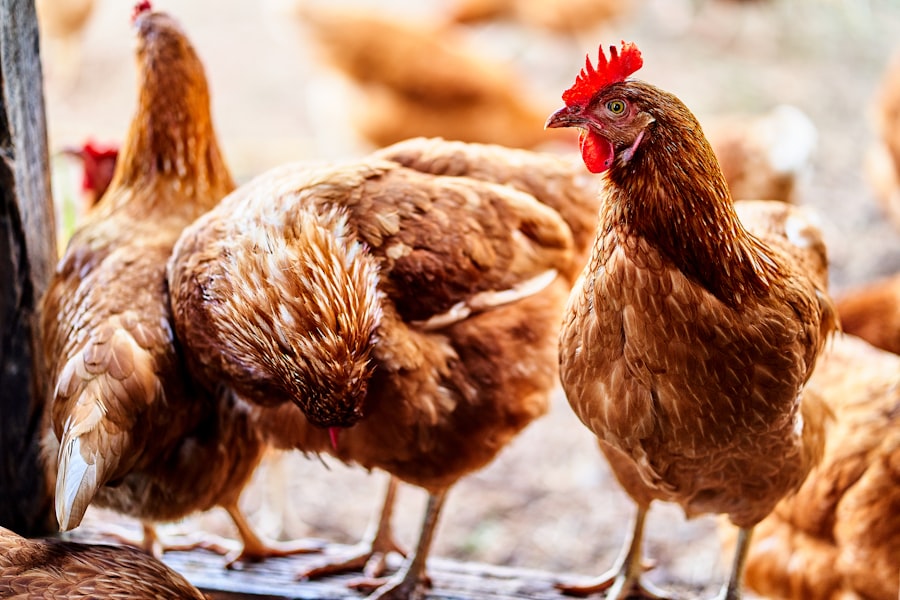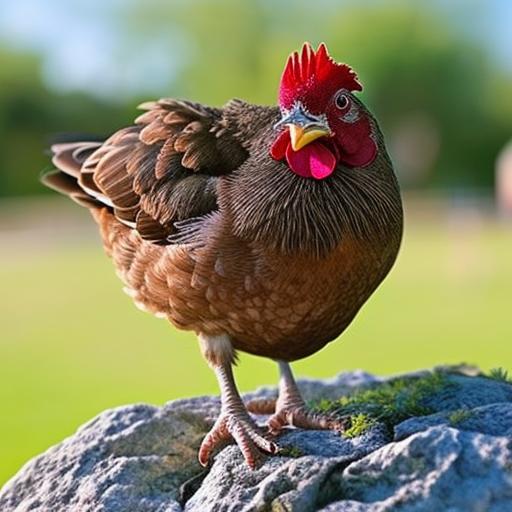Keeping chickens in Texas can be a rewarding and beneficial experience for many reasons. First and foremost, raising chickens allows you to have a constant supply of fresh eggs right in your own backyard. Not only are these eggs delicious and nutritious, but they also provide a sense of self-sufficiency and reduce your reliance on store-bought eggs.
Another benefit of keeping chickens in Texas is that they can serve as natural pest control. Chickens love to eat insects, such as grasshoppers, ticks, and even small rodents. By allowing your chickens to roam freely in your yard, you can reduce the population of these pests without the need for harmful chemicals.
Lastly, raising chickens can be a fun and educational hobby for the whole family. Children can learn about responsibility by taking care of the chickens and collecting eggs. It also provides an opportunity to teach them about where their food comes from and the importance of sustainable living.
Key Takeaways
- Keeping chickens in Texas is a great idea for fresh eggs, natural pest control, and a fun hobby.
- Choose chicken breeds that are heat-tolerant and adaptable to Texas weather, such as Leghorns and Rhode Island Reds.
- Building a chicken coop requires proper ventilation, insulation, and predator-proofing techniques.
- Provide a balanced diet for your chickens with a mix of grains, protein, and calcium supplements.
- Protect your chickens from predators like coyotes, raccoons, and snakes by using fencing, netting, and secure coops.
Choosing the Right Chicken Breeds for Texas Weather
When it comes to choosing chicken breeds for the hot Texas weather, it’s important to select breeds that can withstand high temperatures and humidity. Some recommended breeds include Rhode Island Reds, Leghorns, and Australorps.
Rhode Island Reds are known for their hardiness and ability to tolerate heat. They have a good temperament and are excellent layers, producing large brown eggs. Leghorns are another breed that thrives in hot climates. They are known for their high egg production and ability to handle heat well. Australorps are also a great choice for Texas weather. They have black feathers that help protect them from the sun and are known for their docile nature.
Building a Chicken Coop: Tips and Tricks for Beginners
Building a chicken coop may seem like a daunting task, but with the right guidance, it can be a rewarding project. Here are some tips and tricks for beginners:
1. Choose the right location: The coop should be placed in a well-drained area that receives plenty of sunlight. It should also be protected from strong winds and have easy access to water.
2. Use the right materials: The coop should be sturdy and predator-proof. Use materials such as pressure-treated lumber, hardware cloth, and galvanized nails to ensure durability.
3. Size matters: The size of the coop will depend on the number of chickens you plan to keep. As a general rule, each chicken should have at least 4 square feet of space inside the coop and 10 square feet in the outdoor run.
4. Provide proper ventilation: Good airflow is essential to prevent heat stress in chickens. Install windows or vents in the coop to allow for proper ventilation.
Understanding Chicken Nutrition for Optimal Health
Providing chickens with a balanced diet is crucial for their overall health and egg production. A well-balanced diet should consist of a combination of grains, protein, fruits, vegetables, and calcium.
Grains such as corn, wheat, and oats are a good source of energy for chickens. Protein can be provided through sources like soybean meal, fish meal, or mealworms. Fruits and vegetables should be offered as treats and can include items like apples, carrots, and leafy greens.
Calcium is especially important for egg-laying hens as it helps in the formation of strong eggshells. Crushed oyster shells or eggshells can be provided as a calcium supplement.
It’s important to note that chickens also require access to fresh water at all times. Water is essential for digestion, temperature regulation, and overall health.
Keeping Your Chickens Safe from Predators in Texas
Texas is home to a variety of predators that pose a threat to chickens, including coyotes, hawks, raccoons, and snakes. Here are some tips on how to protect your chickens:
1. Use fencing: Install a sturdy fence around the coop and run area to keep out predators. The fence should be buried at least 12 inches deep to prevent digging.
2. Secure the coop at night: Predators are most active at night, so it’s important to secure the coop to keep your chickens safe. Make sure all doors and windows are securely closed and consider using locks or latches for added security.
3. Provide shelter: Offer your chickens a safe place to hide during the day, such as dense shrubs or bushes. This will provide them with protection from aerial predators like hawks.
4. Use deterrents: Consider using deterrents such as motion-activated lights, noise-making devices, or even a guard dog to deter predators from approaching the coop.
The Importance of Proper Chicken Hygiene and Health

Maintaining good hygiene is essential for keeping your chickens healthy and preventing the spread of diseases. Here are some tips on how to maintain proper chicken hygiene:
1. Clean the coop regularly: Remove droppings, old bedding, and any other debris from the coop on a regular basis. This will help prevent the buildup of bacteria and parasites.
2. Provide fresh water: Chickens require clean and fresh water at all times. Make sure to clean and refill their water containers daily.
3. Dust baths: Chickens naturally take dust baths to keep their feathers clean and free from parasites. Provide a designated area in the coop or run where they can take dust baths.
4. Quarantine new birds: If you introduce new chickens to your flock, it’s important to quarantine them for a period of time to ensure they are healthy and free from any diseases that could spread to the rest of the flock.
Egg-Laying: Maximizing Your Chickens’ Production
Maximizing egg production in your chickens requires attention to their environment, diet, and overall health. Here are some tips to help you get the most out of your hens:
1. Provide a comfortable nesting area: Chickens prefer a quiet and dark area to lay their eggs. Provide nesting boxes filled with clean bedding material, such as straw or wood shavings.
2. Ensure a balanced diet: A well-balanced diet is crucial for egg production. Make sure your chickens are getting enough protein, calcium, and other essential nutrients.
3. Monitor lighting: Chickens require a certain amount of daylight to stimulate egg production. If natural light is not sufficient, consider using artificial lighting to provide the necessary hours of daylight.
4. Minimize stress: Stress can negatively impact egg production. Minimize stressors such as loud noises, overcrowding, and sudden changes in their environment.
Chicken Behavior: Understanding Your Flock’s Needs
Understanding chicken behavior is key to providing them with a healthy and happy environment. Here are some behaviors to look out for and tips on meeting their needs:
1. Roosting: Chickens naturally roost at night, so it’s important to provide them with roosting bars or perches in the coop.
2. Dust bathing: Chickens take dust baths to keep their feathers clean and free from parasites. Provide a designated area with loose soil or sand for them to dust bathe.
3. Social interaction: Chickens are social animals and thrive when they have companionship. Make sure to provide enough space for them to interact with each other and consider adding new chickens to the flock if needed.
4. Foraging: Chickens love to forage for insects and plants. Allow them access to a safe outdoor area where they can scratch and peck for food.
Troubleshooting Common Chicken Problems in Texas
While raising chickens in Texas can be rewarding, it’s important to be aware of common problems that may arise. Here are some common issues and tips on how to troubleshoot them:
1. Heat stress: Texas summers can be extremely hot, and chickens are susceptible to heat stress. Provide shade, plenty of fresh water, and consider using fans or misters to keep them cool.
2. Egg binding: Egg binding occurs when a hen is unable to lay an egg. This can be a life-threatening condition. If you notice a hen straining or showing signs of distress, seek veterinary assistance immediately.
3. Parasites: Chickens can be susceptible to external and internal parasites such as mites, lice, and worms. Regularly inspect your chickens for signs of infestation and treat accordingly.
4. Egg eating: Occasionally, chickens may develop a habit of eating their own eggs. This can be a difficult behavior to break. Provide plenty of calcium-rich foods and ensure the chickens have comfortable nesting boxes to reduce the likelihood of egg breakage.
Enjoying the Benefits of Raising Chickens in Texas
Raising chickens in Texas can be a rewarding experience that provides fresh eggs, natural pest control, and a fun hobby for the whole family. By choosing the right chicken breeds, building a proper coop, providing a balanced diet, and taking steps to protect your flock from predators and maintain good hygiene, you can enjoy the benefits of raising chickens while overcoming common challenges.
So why not give it a try? With some planning and preparation, you can enjoy the rewards of raising your own chickens in Texas. Whether it’s the joy of collecting fresh eggs each morning or the satisfaction of knowing you’re reducing your carbon footprint, keeping chickens can be a fulfilling and sustainable endeavor.
If you’re interested in keeping chickens in Texas, you may also want to explore the fascinating world of turkey breeding. Poultry Wizard has an informative article on the mating season for turkeys, which can provide valuable insights for beginners. Understanding the intricacies of turkey breeding can help you make informed decisions when it comes to raising these beautiful birds. To learn more about this topic, check out their article on mating season for turkeys. Additionally, if you’re considering expanding your poultry collection, Poultry Wizard also offers a helpful guide on how to care for goslings, which can be found at https://poultrywizard.com/breeding-geese/how-to-care-for-goslings/. And don’t forget to read their article on where to put your chicken coop for more practical tips at https://poultrywizard.com/keeping-chickens/where-to-put-chicken-coop/. Happy poultry keeping!
FAQs
What are the basic requirements for keeping chickens in Texas?
To keep chickens in Texas, you need a coop or a shelter that provides protection from predators, a fenced area for them to roam around, and a source of clean water and food.
What kind of chickens are suitable for Texas climate?
Chickens that are suitable for Texas climate are those that can tolerate heat and humidity. Some of the breeds that are suitable for Texas include Rhode Island Reds, Leghorns, and Plymouth Rocks.
How many chickens can I keep in my backyard in Texas?
The number of chickens you can keep in your backyard in Texas depends on the city or county regulations. Some cities allow up to 10 chickens, while others may have restrictions on the number of chickens you can keep.
What kind of food do chickens need?
Chickens need a balanced diet that includes grains, protein, and vitamins. You can feed them commercial chicken feed or a mix of grains, such as corn, wheat, and oats. They also need access to clean water at all times.
How often do I need to clean the chicken coop?
You need to clean the chicken coop at least once a week to prevent the buildup of bacteria and parasites. You should also clean the coop more frequently during the summer months when the heat and humidity can cause more odor and bacteria.
What are some common health problems that chickens may face?
Chickens may face health problems such as respiratory infections, mites and lice infestations, and egg-laying problems. It is important to monitor your chickens’ health and seek veterinary care if necessary.
Do I need a rooster to get eggs from my hens?
No, you do not need a rooster to get eggs from your hens. Hens will lay eggs regardless of whether there is a rooster present or not. However, if you want fertilized eggs to hatch into chicks, you will need a rooster.
Meet Walter, the feathered-friend fanatic of Florida! Nestled in the sunshine state, Walter struts through life with his feathered companions, clucking his way to happiness. With a coop that’s fancier than a five-star hotel, he’s the Don Juan of the chicken world. When he’s not teaching his hens to do the cha-cha, you’ll find him in a heated debate with his prized rooster, Sir Clucks-a-Lot. Walter’s poultry passion is no yolk; he’s the sunny-side-up guy you never knew you needed in your flock of friends!







